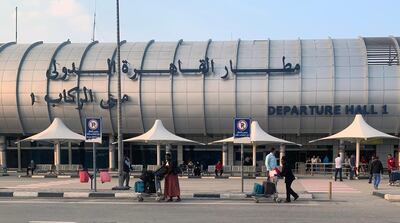As the world grapples to contain the spread of Covid-19, travel policies and restrictions around the globe are changing constantly.
Facing a mounting public health threat, many Middle Eastern countries have introduced new measures to combat the pandemic. Several states have barred travellers from entry if they have been in or are coming from China, Iran, Italy or South Korea. Others have issued blanket quarantine rules on returning passengers or closed their land, sea or air borders.
Listed below are the restrictions in place at popular destinations in the region. This story will be updated regularly, but the latest updates on the spread of the coronavirus can be found here.
UAE: visas suspended and no entry for residents

UAE residents who are abroad will not be allowed to re-enter the country from noon on March 19 for a two-week period, that could be extended further. Only Emiratis who are overseas can pass through the country's borders.
The news comes after Emiratis were banned from travelling and anyone arriving in the UAE was ordered to complete a mandatory 14-day self-quarantine period.
All entry visas for the UAE have been temporarily suspended until further notice. Only diplomatic passport holders are exempt from this.
Travellers who were eligible for visas on arrival can no longer avail of this service. This includes those from a list of 45 countries including the United Kingdom, the United States, Canada and Australia.
Additional screening methods are in place at Dubai and Abu Dhabi airports.
All flights to and from Lebanon, Iraq, Syria and Turkey are suspended from March 17. Several other routes across the Emirates and Etihad networks have had services reduced or suspended and travellers should check with their airline before flying. No cruise ships can dock in the UAE until further notice.
The Ministry of Foreign Affairs and International Co-operation urged any Emiratis living or travelling abroad to return home.
Previously anyone who has recently returned from a high-risk country had to self-isolate for 14 days upon returning to the UAE. High-risk countries include China, Hong Kong, South Korea, Japan, Singapore, Iran, Italy, Germany, France and Spain.
Bahrain: no visas on arrival
Bahrain has stopped issuing all visas on arrival from March 18, the country’s ministry of interior said. This excludes those travelling on diplomatic passports. Only residents and nationals of Bahrain, GCC nationals and those with existing visas will be allowed to enter.
Flights between Bahrain and Saudi Arabia are suspended and the King Fahd Causeway is closed to all traffic. Gulf Air, the national carrier of Bahrain, has also suspended flights to several destinations from March 18. Flights will operate only between Manama and Abu Dhabi, Dubai, Muscat, London, Paris, Frankfurt, Istanbul, Cairo, Mumbai, Delhi, Cochin, Karachi and Manila, with all other services suspended.
Residents and GCC nationals who have visited China, Hong Kong, Iran or Iraq in the 14 days prior to travel to Bahrain will have to undergo quarantine. All travellers arriving in Bahrain from China, Iran, South Korea, Iraq, Hong Kong, Italy, Lebanon, Egypt, Malaysia, Thailand, Singapore, Japan, the European Union, the UK or the US will be subject to medical tests and screening.
Kuwait: no commercial passenger flights
Kuwait has suspended all commercial passenger flights and entry to any travellers other than nationals and residents of Kuwait, their immediate relatives and domestic workers.
Nationals who have visited Bangladesh, China, Egypt, Hong Kong, India, Iran, Iraq, Italy, Japan, South Korea, Lebanon, Philippines, Singapore, Sri Lanka, Syria or Thailand in the two weeks before travel must obtain prior approval to enter Kuwait and complete a Ministry of Health form. Mandatory quarantine will apply to anyone who has visited Bangladesh, Egypt, India, Lebanon, Philippines, Sri Lanka or Syria in the 14 days before arriving in Kuwait.
Oman: entry only for GCC nationals and residents
From March 17, Oman barred the entry of non-Omanis into the sultanate by land, sea or air, with the exception of nationals and citizens of other GCC states. Everyone entering the country, including Omanis, will have to undergo a 14-day quarantine period. Foreigners holding Omani residence cards will be allowed re-entry, and transit passengers can enter the country but cannot leave its airports.
Saudi Arabia: two-week flight suspension
Passenger flights in and out of the kingdom are suspended for a two-week period from March 15, except special services from Etihad and Emirates that will help fly Saudi nationals home. Only Saudi nationals are allowed into the country.
Restrictions are in place on travellers who have visited Bahrain, China, Taiwan, Djibouti, Egypt, Eritrea, Ethiopia, France, Germany, Hong Kong, India, Indonesia, Iran, Italy, Kenya, South Korea, Kuwait, Lebanon, Macau, Oman, Pakistan, Philippines, Somalia, South Sudan, Spain, Sri Lanka, Sudan, Syria, Taiwan, Turkey or the United Arab Emirates.
Anyone returning to the country is advised to self-quarantine for 14 days. Citizens and foreign residents in Saudi Arabia are banned from travelling to Bahrain, Egypt, France, Germany, Iraq, Italy, Kuwait, Lebanon, Oman, South Korea, Spain, Syria, Turkey and the United Arab Emirates.
Qatar: no inbound passenger flights after March 18
Entry is suspended for all non-Qataris. Citizens re-entering must undergo a 14-day qurantine period.
All inbound flights are suspended from March 18, with the exception of cargo or transit flights. Transit passengers can still travel via Doha but cannot leave the airport. No new visas will be processed during this time, including work and business visas.
Egypt: suspension of commercial flights

The Egyptian government has announced that commercial international flights to Egypt will be suspended from March 19 until March 31. Tourists currently in Egypt will be allowed to leave on their booked charter flights and cargo and domestic flights will continue to operate. During this two-week period, all hotels and tourist attractions will undergo sterilisation. No entry for Qatari nationals.
Iraq: week-long curfew
A week-long curfew started on March 17, and all flights to and from Baghdad’s international airport will be suspended. There will be no entry for any travellers from 13 countries, including Germany, Qatar, China, Hong Kong, Macau, Iran, Japan, South Korea, Thailand, Singapore, Italy, Bahrain and Kuwait. Citizens cannot re-enter the country if they have been in China or Iran.
This does not apply to nationals or foreign residents, but quarantine procedures are in place for those returning to Iraq who have visited any of the listed countries.
Jordan: passenger flights suspended and quarantine
All passenger flights in and out of Jordan are suspended until March 31. The country’s land and sea borders are also closed to travellers. Diplomatic passport holders are exempt, but compulsory 14-day quarantine is in place for all arrivals, including Jordanian nationals.
Lebanon: shutting borders
Lebanon will temporarily shut its airports, borders and ports from March 18. All commercial flights in and out of the country are suspended until March 29. Cargo, diplomatic and UN flights will still operate, but travellers will be subject to quarantine. Transit passengers are also banned during this period.


